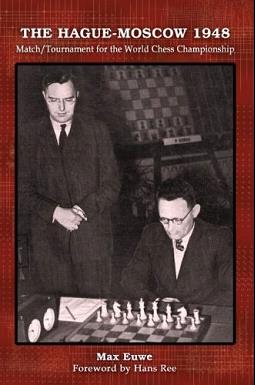 |
Book Reviews |
Last updated 3 January 2014

| index |
The Hague – Moscow 1948

by Max Euwe
Hello again! This time I’ve chosen my favourite book subject – a tournament book! My choice this time is the recently published The Hague – Moscow 1948, an in-depth account of the historic "match/tournament" for the World Championship authored (in the main) by the Dutch former World Champion (and later FIDE President) Max Euwe.
Euwe’ s annotations to all the 50 games from the event are made available in English for the first time (I recollect vaguely being able to borrow a book on the event published by G. Bell & Sons in English during my youth in the mid-60’s but can’t remember either the author or the games annotator, maybe it was Golombek.)
As its title may indicate, the book is a trip back into chess history, in this instance to perhaps one of the most significant tournaments of all time. The event, prompted by Alekhine’s death in 1946, marked the beginnings of an organised cyclical structure for the World Championship, later clearly defined by FIDE, and the commencement of the period of Soviet hegemony in such events which continued until 1972 and Fischer’s short era.
The event itself comprised of 5 players, the Dutchman Euwe, the American Reshevsky and 3 Soviets, the Russians Botvinnik and Smyslov and the Estonian Keres, where the competitors played all of the others 5 times (20 games over 25 rounds) with the first 2 cycles played at The Hague in the Netherlands and the remaining 3 in Moscow. The original plan for the event had earlier been that 6 players should play only 4 games against everyone but the 6th player, American Reuben Fine, chose to drop out only a few days before the scheduled start.
The 1st round was played on 2nd March 1948 and the 10th and last in The Hague on 25th March (apparently there was a very generous allocation of "free" days although some of these were doubtless used for adjourned games) – thereafter everyone folded up their tents and moved by rail to Moscow where, after a break of more than 2 weeks, Round 11 was held on 11th April. The 25th and Final Round was eventually held on 16th May, some 2½ months after the event had started – it is very difficult to imagine any event nowadays, when a player’s entire career may be defined in a 2 game match in a World Cup event, having such a very lengthy duration.
The book however comprises of much more than merely the 50 annotated games provided by Euwe. It begins with a brief foreword by the Dutch GM Hans Ree which concentrates largely on “political” issues both before and during the event much of which refers to Keres’s (a very reluctant Soviet citizen) performance in his games against Botvinnik (very much a Soviet citizen) where he lost the first 4, the last of which saw an acknowledged endgame virtuoso contrive to make a series of basic errors to lose what should have been a drawn Rook and pawn end-game (look for yourself and draw your own conclusion!). Keres did manage to finally beat Botvinnik for the first time in 13 attempts in the last round but by that time the event was already decided.
Thereafter there are 2 smaller sections written by 2 members of the Dutch Chess Federation at that time, the President Dr Hannak and another official, Zittersteyn, relating to not only the protracted difficulties in organising the event, establishing its final venues and composition of the field (apparently there had been suggestions to include the Argentine Najdorf and the Russian Boleslavsky but these came to nothing), but also earlier and quickly aborted plans, prior to Alekhine’s death, to hold a title match between Alekhine and Botvinnik.
The Soviets refused point blank to even consider this and Western nations were happy to divest themselves of the previous champion, heavily impugned by his conduct during the war years. However it is then reported that the Soviets performed a sudden volte face expressing willingness that a match be held but Alekhine died suddenly.
Displaying the diplomatic skills for which he was later to become renowned during time as FIDE President, Euwe takes nothing to do with any of this and, in the main section of the book, provides not only in-depth annotations in figurine notation to the 50 games with Round by Round Reports but, in another section prior to this, lighter annotations to the 75 games played prior to the event amongst the 5 competitors "The Games from the Past".
The book ends with small sections by Hannak and Zittersteyn on the Closing Ceremony which includes reference to Botvinnik’ s political skills which he was later to use to his considerable advantage "But a man cannot grow if he is not surrounded by good friends, and of those I have many,"" and summaries of the playing careers of Euwe and Botvinnik.
My only small quibble would be that the Round by Round Reports rarely provides Progressive Scores and there is no table with these although admittedly there was a bye in every round. You may not care much for tournaments books but I would recommend this one!